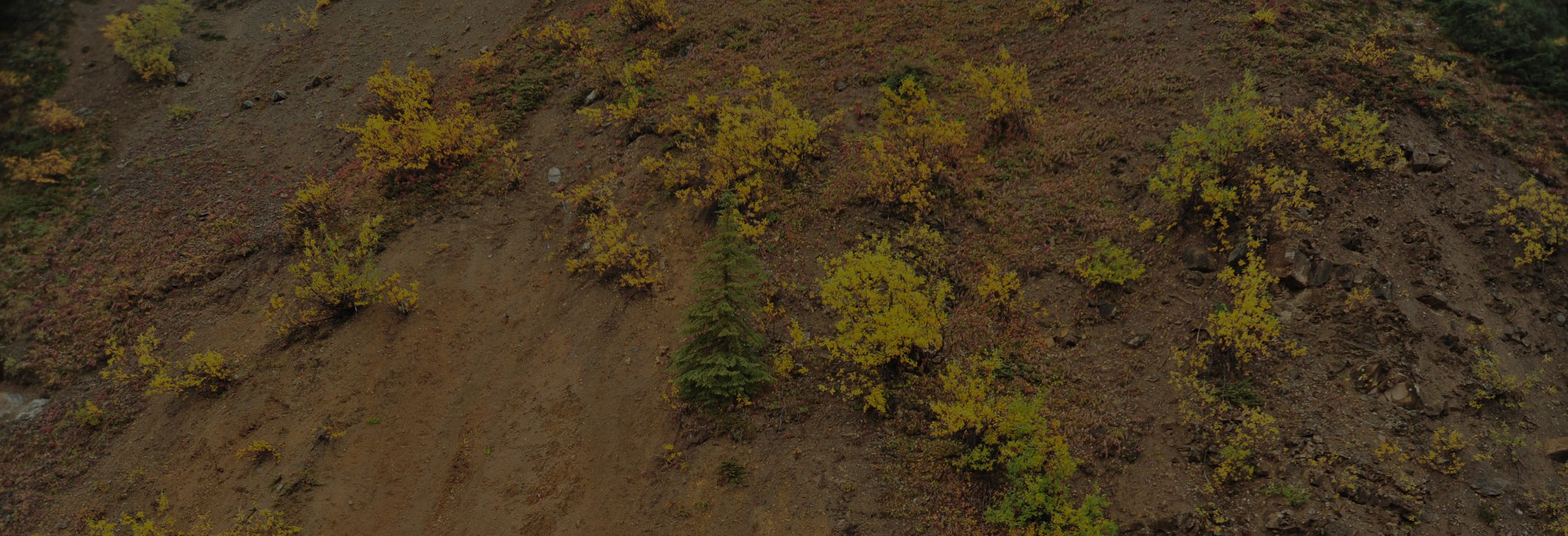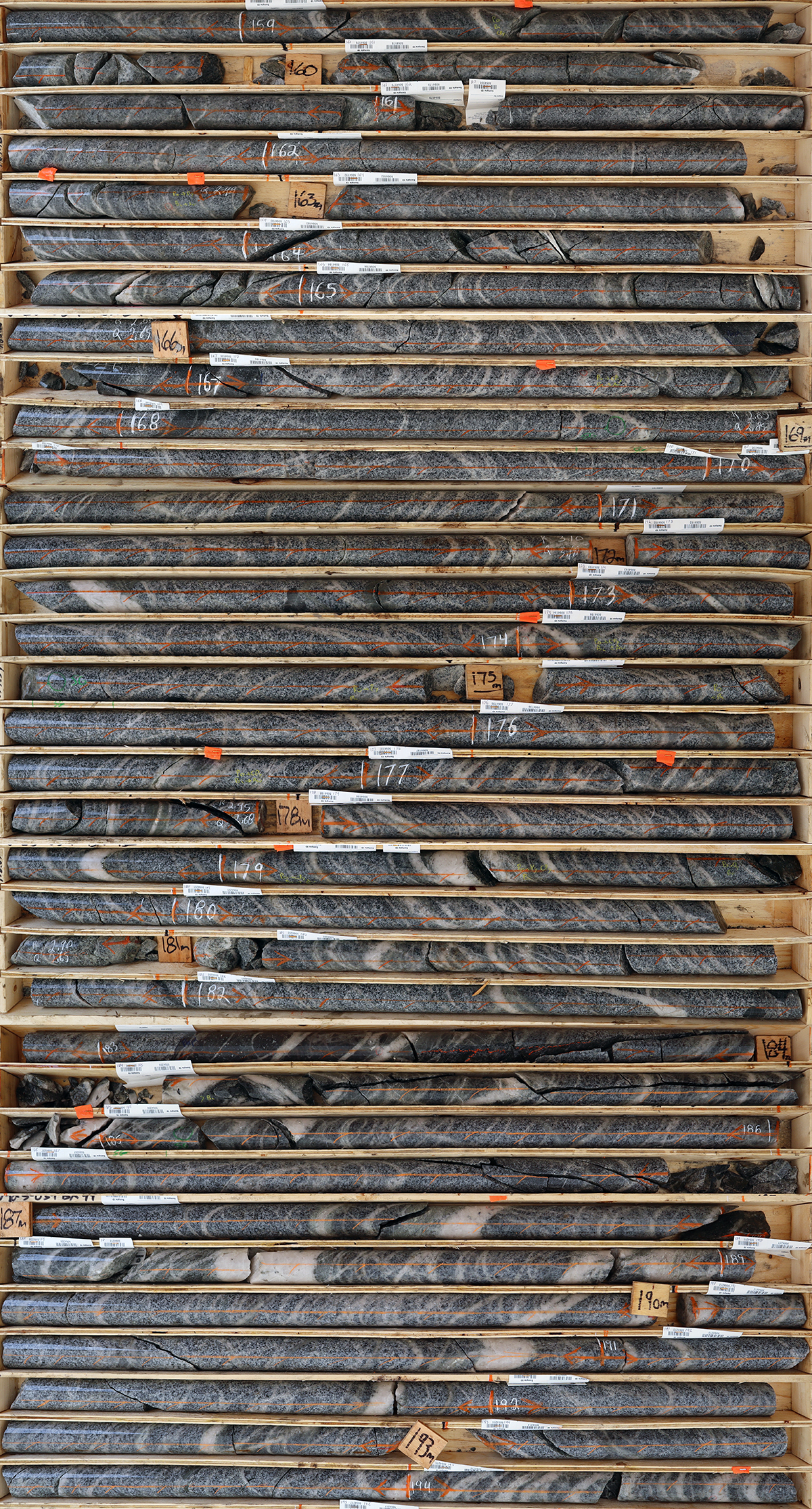- Hole V-23-034 returned 3.08 g/t Au over 216.0 m within broader mineralized interval averaging 1.88 g/t Au over 418.3 m from surface along entire hole
- Highest sustained gold grades at Rogue Project’s Valley target to date—including 6.38 g/t Au over 15.4 m and 5.23 g/t Au over 24.0 m—redefine and expand the near-surface, multiple-gram-per-tonne gold corridor central to the target
- Total drilling at Valley in 2023 (>5,800 m) already exceeds metres drilled by August 7, 2022, with drilling ongoing and assay results for all remaining holes pending.
Vancouver, B.C., July 5, 2023: SNOWLINE GOLD CORP. (TSX-V: SGD) (OTC: SNWGF) (the “Company” or “Snowline”) is pleased to announce preliminary assay results from the first hole of its 2023 drilling program at the Valley target on its Rogue Project in Canada’s Yukon Territory. Hole V-23-034, drilled to test the northeast margin of Valley’s near surface, well-mineralized corridor, hit the strongest gold grades sustained over >10 m downhole intervals at Valley to date, expanding the known spatial extent of multiple-gram-per-tonne gold mineralization within the target intrusion. Three drills are currently active at Valley, with >5,800 m of drilling and 13 holes completed on the target to date. Analytical results for all holes beyond V-23-034 are pending, with drilling ongoing.

Table 1 – Preliminary highlight summary of Snowline’s latest assay results. *Interval widths reported; true widths of the system are not yet known.
“Our first drill hole of 2023 was drilled to test what we thought was the edge of a relatively high-grade gold corridor within the Rogue Project’s Valley intrusion,” said Scott Berdahl, CEO & Director of Snowline. “It ended up as Snowline’s second-best drill hole to date.” The entire 418 metre hole is mineralized. The consistency of gold grades over large distances is remarkable. Internal intervals ranging from 15 to 25 metres in length bear higher gold grades than we have previously seen at Valley. These results highlight the discovery potential still present within and around the broad spatial footprint that we tested with sparse drilling last season. We eagerly await the many forthcoming analytical results from our ongoing drill campaign at Valley, in addition to stepping out to drill test additional intrusion-related gold targets on the broader Rogue Project over the coming weeks.”
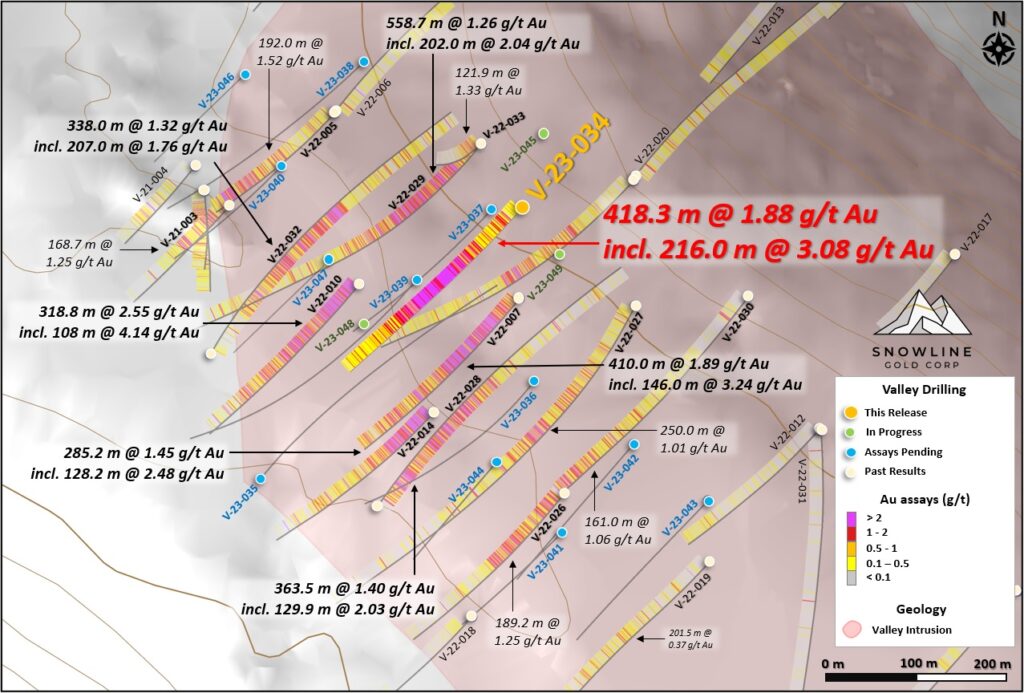
Figure 1 – Plan view of the Rogue Project’s Valley target showing analytical results from previous and current drilling, along with approximate traces of current holes. The high level of consistency of mineralization can be seen in the distribution of assay values down holes. Within the broader mineralized interval in V-23-034, a continuous 98.0 m run from 165.0 m downhole did not return any assays below 1.00 g/t Au, with an average over that stretch of 4.30 g/t Au. Results from the Valley target consistently carry unusually high grades for a reduced intrusion-related gold system.
HOLE V-23-034
Hole V-23-034 is collared within the Valley intrusion, northeast of the near-surface, >2 g/t Au corridor discovered in 2022. The hole is a 200 m step-back along section to the northeast from the collar site for V-22-010 (318.8 m @ 2.55 g/t Au including 108.0 m @ 4.14 g/t Au from surface, see Snowline news release dated October 12, 2022). It is roughly 100 m to the north of V-22-007 (410.0 m @ 1.89 g/t Au from surface including 146.0 m @ 3.24 g/t Au, see Snowline news release dated November 15, 2022) and 80 m southeast of the nearest hole, V-22-029 (558.7 m @ 1.26 g/t Au from surface including 202.0 m @ 2.04 g/t Au, see Snowline news release dated February 24, 2023).
The hole intersected abundant sheeted quartz veins in granodiorite, with three distinct vein generations each carrying trace visible gold. The entire hole was mineralized, returning 1.88 g/t Au over 418.3 m from bedrock surface at approximately 5.7 m downhole depth, including a higher-grade interval of 3.08 g/t Au over 216.0 m from 109.0 m downhole, or 4.12 g/t Au over 121.4 m from 158.0 m downhole depending on interval selection parameters. Within the higher-grade zone are three of the highest grade >10 m gold intersections seen at Valley to date, including 5.23 g/t Au over 24.0 m, 4.74 g/t Au over 16.5 m and 6.38 g/t Au over 15.4 m as separate intervals (Table 2). Beginning at 278.6 m downhole, a 0.8 m zone of quartz and fault gouge returned the highest assay of the hole at 27.95 g/t Au. The hole ended in low-level mineralization within the intrusion, with the final 20.0 m averaging 0.29 g/t Au.
Within the 121.4 m interval at 4.12 g/t Au, 114 of 146 samples assayed higher than 2.0 g/t Au—representing 96.8 m (non-contiguous) or 80% of the downhole interval. Only a single assay within this interval—1 m downhole distance—returned a value <0.5 g/t Au. Within the same interval, beginning from 165.0 m downhole, 109 of 109 contiguous samples (98.0 m downhole length) all assayed >1 g/t Au, averaging 4.30 g/t Au.
While high grades of up to 27.95 g/t Au are present, they are not primary drivers of the broader mineralized intervals. Applying a cap at 10 g/t Au reduces the average grade of the 418.3 m hole by just 3.4% from 1.88 g/t Au to 1.82 g/t Au, with a similarly subtle effect on sub-intervals (Table 2). This grade continuity is an important factor in efficient exploration, as it facilitates greater understanding of the gold system with fewer metres drilled. It could also prove beneficial to any future extraction by increasing predictability of gold grades and reducing internal dilution.
Results from V-23-034 expand the known extent of near surface, >2 gram per tonne gold mineralization at Valley and further demonstrate strong continuity of mineralization at Valley.

Table 2 – Summary of mineralization observed in V-23-034. The consistency of strong mineralization is reinforced by the capped values in the rightmost column, wherein any assay result >10 g/t Au is replaced by 10.0 g/t Au to calculate the average interval grades. The high results demonstrate uniform gold mineralization that is not “smeared” across a given interval by isolated high-grade samples. *Interval widths reported; true widths of the system are not yet known, with different vein generations, orientations and grade distributions present within various intervals through the bulk tonnage gold target at Valley.
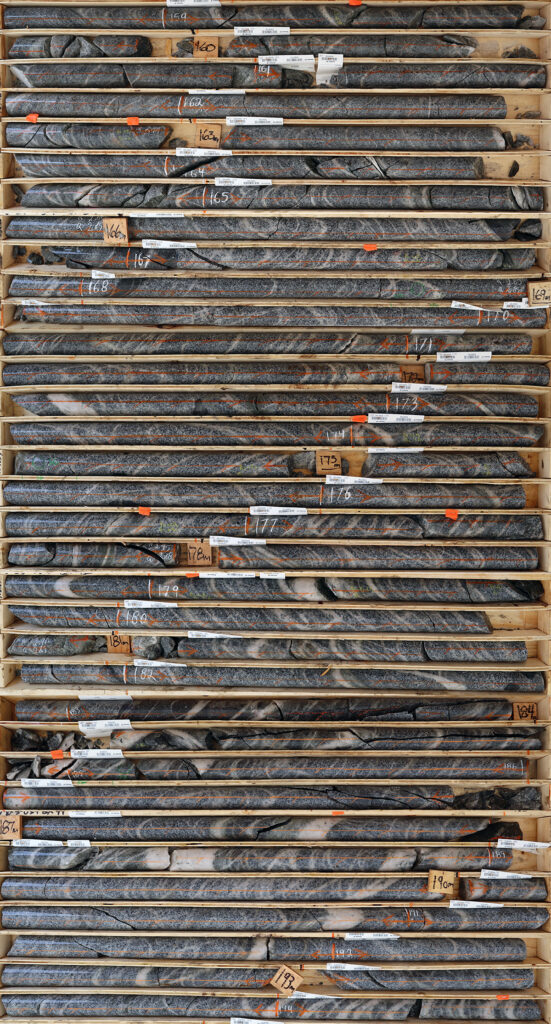
Figure 2 – Quartz vein mineralization in V-23-034, from 158.7 m to 194.5 m downhole, a subset of a larger run of similar moderate to high quartz vein density beginning at bedrock surface. The core shown averages 4.32 g/t Au. It sits atop a 121.4 m interval averaging 4.12 g/t Au from 158.0 m downhole, with 80% of assays by distance returning >2 g/t Au. True widths have not been determined.
EXPLORATION UPDATE
The 10,000+ m drill program at the Rogue Project’s Valley discovery is ongoing, with three drill rigs active on site. To date, > 5,800 m have been drilled on the Valley target in 2023, with 13 holes completed and an additional 3 holes in progress. Additional field crews are conducting surface programs on multiple targets across the Rogue Project, in preparation for 5,000+ m drilling on multiple Rogue Project targets outside of Valley.
Prior to the commencement of the field season, after assessing various options to improve assay turnaround time and after a program of umpire sample testing, the Company switched to a dedicated service stream for its sampling. The apparent improvement in turnaround times will help with timely decision making and iterative, results-based exploration within a single field season. Analytical results for all holes drilled in 2023 following V-23-034 are still pending.
Outside of Rogue, a team of Snowline personnel has mobilized to the Company’s Tosh and Cliff Projects, which cover orogenic gold targets in the southwestern Yukon. The team will be completing prospecting and mapping work and setting drill collar sites for the drill testing of both projects, the first ever drilling on either of these greenfield gold projects.
QA/QC
On receipt from the drill site, Valley’s NQ2-sized drill core was systematically logged for geological attributes, photographed and sampled at Snowline’s 2023 field camp. Sample lengths as small as 0.5 m were used to isolate features of interest, but most samples within moderate to strong mineralization were 1.0 m in length; otherwise, a default 1.5 m downhole sample length was used. Core was cut in half lengthwise along a pre-determined line, with one half (same half, consistently) collected for analysis and one half stored as a record. Field duplicates were collected at regular intervals as ¼ core samples by splitting the ½ core sent for sampling, leaving a consistent record of half core material from duplicate and non-duplicate samples alike. Standard reference materials and blanks were inserted by Snowline personnel at regular intervals into the sample stream. Bagged samples were sealed with security tags to ensure integrity during transport. They were delivered by expeditor to Bureau Veritas’ preparatory facility in Whitehorse, Yukon. Sample preparation was completed in Whitehorse, with analyses completed in Vancouver.
Bureau Veritas is accredited to ISO/IEC 17025 and ISO9001 for quality management. Samples were crushed by BV to >85% passing below 2 mm and split using a riffle splitter. 250 g splits were pulverized to >85% passing below 75 microns. A four-acid digest with an inductively coupled plasma mass spectroscopy (ICP-MS) finish was used for 59-element analysis on 0.25 g sample pulps (BV code: MA250). All samples were analysed for gold content by fire assay with an atomic absorption spectroscopy (AAS) finish on 30 g samples (BV code: FA430). Any sample returning >10 g/t Au was reanalysed by fire assay with a gravimetric finish on a 30 g sample (BV code: FA530).
Results reported herein are considered preliminary following receipt of a low but expected percentage of abnormal assays from standard and blank samples inserted by the Company into the Valley sample stream. (Standard samples are prepared by a third-party laboratory to have known quantities of gold, and blank samples are known to contain very limited concentrations of gold.) Reanalysis of samples run along with these reference materials will provide greater certainty in the final assay numbers. These results will be reported if a material difference is identified between the current assays and the re-run sample batches. Based on the widespread and relatively consistent mineralization throughout mineralized zones, however, the Company does not believe that the re-analysis of this relatively small number of samples will have a significant impact on the preliminary mineralized intervals reported herein.
ABOUT ROGUE
The Valley target on Snowline’s flagship Rogue Project is a newly discovered, bulk tonnage style, reduced intrusion-related gold system (RIRGS), with geological similarities to multi-million-ounce deposits currently in production such as Kinross’s Fort Knox Mine in Alaska and Victoria Gold’s Eagle Mine in the Yukon. Early drill results demonstrate unusually high gold grades for such a system, present near surface across drill intersections of hundreds of metres. Gold is associated with bismuthinite and telluride minerals hosted in sheeted quartz vein arrays within and along the margins of a one-kilometer-scale, mid-Cretaceous aged Mayo-suite intrusion. Valley is an early-stage exploration project without a resource estimate, and while initial results are encouraging, the presence or absence of an economically viable orebody cannot be determined until additional work is completed.
The Rogue Project area hosts multiple intrusions similar to Valley along with widespread gold anomalism in stream sediment, soil and rock samples. Elsewhere, RIRGS deposits are known to occur in clusters. The Rogue Project is thus considered by the Company to have district-scale potential for additional reduced intrusion-related gold systems.
ABOUT SNOWLINE GOLD CORP.
Snowline Gold Corp. is a Yukon Territory focused gold exploration company with an eight-project portfolio covering >333,000 ha. The Company is exploring its flagship >94,000 ha Rogue gold project in the highly prospective yet underexplored Selwyn Basin. Snowline’s project portfolio sits within the prolific Tintina Gold Province, host to multiple million-ounce-plus gold mines and deposits including Kinross’ Fort Knox mine, Newmont’s Coffee deposit, and Victoria Gold’s Eagle Mine. The Company’s first-mover land position and extensive database provide a unique opportunity for investors to be part of multiple discoveries and the creation of a new gold district.
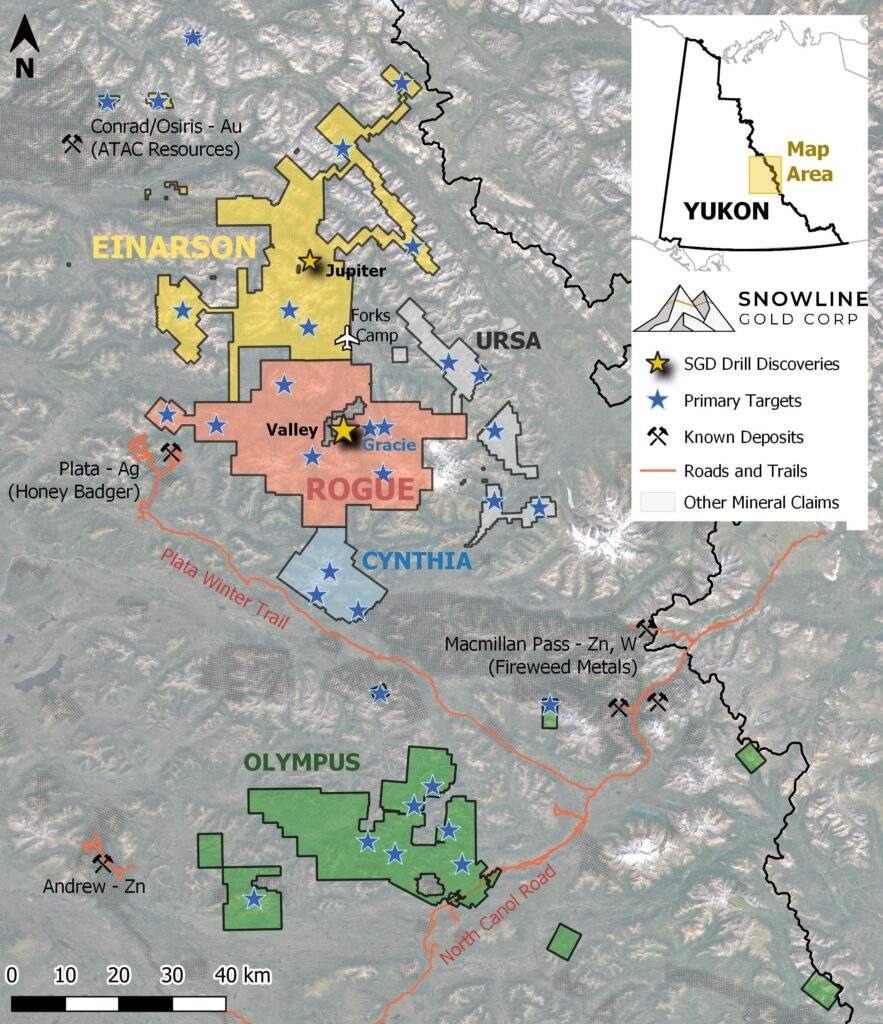
Figure 3 – Project location map for Snowline Gold’s eastern Selwyn Basin properties: Rogue, Einarson, Ursa, Cynthia and Olympus. The current work program at Rogue is based from the Company’s Forks Camp.
QUALIFIED PERSON
Information in this release has been prepared under supervision of and approved by Thomas K. Branson, M.Sc., P. Geo., Vice President of Exploration for Snowline Gold as Qualified Person for the purposes of National Instrument 43-101.
ON BEHALF OF THE BOARD
Scott Berdahl
CEO & Director
For further information, please contact:
Snowline Gold Corp.
+1 778 650 5485
info@snowlinegold.com
CAUTIONARY NOTE REGARDING FORWARD-LOOKING STATEMENTS
This news release contains certain forward-looking statements, including statements regarding the significance of analytical results, the discovery potential within the Valley intrusion, the potential for investors to participate in multiple future discoveries, the Rogue project having district-scale prospectivity, the creation of a new gold district and the Company’s future plans and intentions. Wherever possible, words such as “may”, “will”, “should”, “could”, “expect”, “plan”, “intend”, “anticipate”, “believe”, “estimate”, “predict” or “potential” or the negative or other variations of these words, or similar words or phrases, have been used to identify these forward-looking statements. These statements reflect management’s current beliefs and are based on information currently available to management as at the date hereof.
Forward-looking statements involve significant risk, uncertainties and assumptions. Many factors could cause actual results, performance or achievements to differ materially from the results discussed or implied in the forward-looking statements. Such factors include, among other things: risks related to uncertainties inherent in drill results and the estimation of mineral resources; and risks associated with executing the Company’s plans and intentions. These factors should be considered carefully, and readers should not place undue reliance on the forward-looking statements. Although the forward-looking statements contained in this news release are based upon what management believes to be reasonable assumptions, the Company cannot assure readers that actual results will be consistent with these forward-looking statements. These forward-looking statements are made as of the date of this news release, and the Company assumes no obligation to update or revise them to reflect new events or circumstances, except as required by law.
